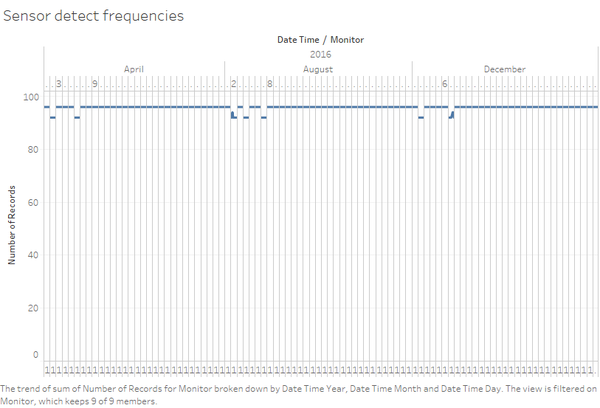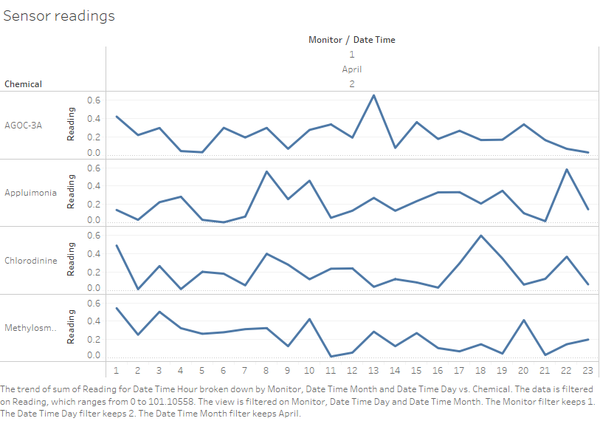Difference between revisions of "ISSS608 2016-17 T3 Assign Qian Hongjun"
Hjqian.2016 (talk | contribs) |
Hjqian.2016 (talk | contribs) |
||
| Line 4: | Line 4: | ||
====Sensor detection frequencies==== | ====Sensor detection frequencies==== | ||
| − | + | [[image:Sensor data frequencies.png|600px]] | |
| − | + | ||
| − | + | Normally, each monitor will have readings for each of four chemicals every one hour from 0:00 to 23:00. That means each monitor will detect 4*24=96 times each day. | |
| + | However, from the graph above, we can see in some days, the monitor only detects 92 times or 94 times each day. Namely, these days are April 2, April 6, August 2, | ||
| + | August 4, August 7, December 2 and December7. These abnormal detection frequencies are questionable and require further investigation. | ||
| − | + | ||
| − | + | [[image:Sensor readings.png|600px]] | |
| − | + | ||
Take the monitor1 in April 2 as an example, we can find the it starts detection from 1:00 am but normally the monitor starts detection from 0:00. The rest of abnormal | Take the monitor1 in April 2 as an example, we can find the it starts detection from 1:00 am but normally the monitor starts detection from 0:00. The rest of abnormal | ||
| − | + | detections are the same situation which the sensors start detection from 1:00 instead of 0:00. The reason may be the sensors are not working properly in these years. | |
| − | + | However, this one hour gap may give the factory some opportunities to discharge the chemicals illegally. Furthermore, we can see a downward trend from 1:00 to 2:00, | |
| − | + | which means it’s highly possible the factory may discharge more chemicals from 0:00 to 1:00 but the sensor was not working properly at that time period. | |
Revision as of 21:28, 7 July 2017
Contents
Answer to the tasks
Task1. Detect sensor performanc
Sensor detection frequencies
Normally, each monitor will have readings for each of four chemicals every one hour from 0:00 to 23:00. That means each monitor will detect 4*24=96 times each day. However, from the graph above, we can see in some days, the monitor only detects 92 times or 94 times each day. Namely, these days are April 2, April 6, August 2, August 4, August 7, December 2 and December7. These abnormal detection frequencies are questionable and require further investigation.
Take the monitor1 in April 2 as an example, we can find the it starts detection from 1:00 am but normally the monitor starts detection from 0:00. The rest of abnormal detections are the same situation which the sensors start detection from 1:00 instead of 0:00. The reason may be the sensors are not working properly in these years. However, this one hour gap may give the factory some opportunities to discharge the chemicals illegally. Furthermore, we can see a downward trend from 1:00 to 2:00, which means it’s highly possible the factory may discharge more chemicals from 0:00 to 1:00 but the sensor was not working properly at that time period.

